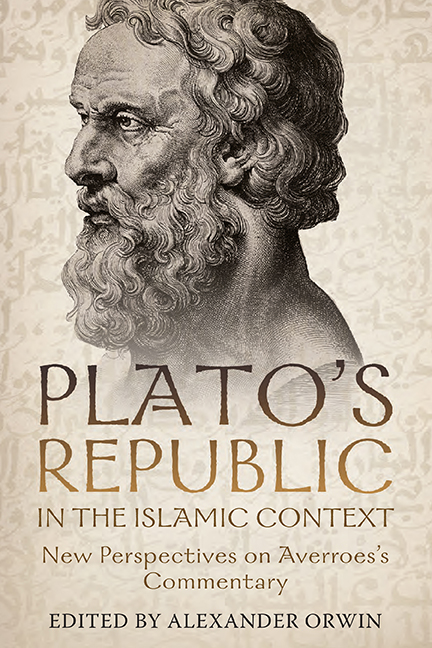Book contents
- Frontmatter
- Dedication
- Contents
- Introduction
- Part One Averroes and His Teachers
- Part Two Poetry, Philosophy, and Logic
- Part Three Law, Religion, and Philosophy
- Part Four Wisdom, Government, and the Character of the Political Community
- Part Five Averroes’s Reception in Europe
- Selected Bibliography
- Notes on the Contributors
- Index
12 - Philosopher-Kings and Counselors: How ShouldPhilosophers Participate in Politics?
Published online by Cambridge University Press: 26 May 2022
- Frontmatter
- Dedication
- Contents
- Introduction
- Part One Averroes and His Teachers
- Part Two Poetry, Philosophy, and Logic
- Part Three Law, Religion, and Philosophy
- Part Four Wisdom, Government, and the Character of the Political Community
- Part Five Averroes’s Reception in Europe
- Selected Bibliography
- Notes on the Contributors
- Index
Summary
The most famous, or infamous, proposal in Plato'sRepublic concernsthe rule of philosopher-kings. Throughout the longhistory of the philosophical reception of Plato,this theme has been explored, restated, and rejectedin countless ways. One of the most originaltreatments of it comes from the Andalusianphilosopher Averroes, in his Commentary on Plato's “Republic.” Thetitle of this inventive work must not be construedtoo narrowly. On every major theme in the Republic, Averroes deviates,either by omission, addition, or editorialcommentary, from Plato. His treatment of thephilosopher-kings will make use of all thesetechniques. Before turning to this topic, I wish tomake some general remarks about the work as awhole.
Averroes announces his departure from Plato in thefirst sentence of the work, with the somewhatcryptic promise to remove all dialectical argumentsfrom the Republicwhile preserving the demonstrative arguments (CR21.4). Dialectic is associated, etymologically andsemantically, with dialogue. Sure enough, Averroesexpunges not only the dialogue form of the originalbut also its principal characters. This choiceshould not simply be attributed to ignorance: evenif we were to assume that Averroes had only asummary of the original, he would surely have knownof the existence of the characters Socrates andThrasymachus through Alfarabi. In fact, Averroeshimself mentions Thrasymachus and his argumentsabout justice in his MiddleCommentary on the Topics.
The form with which Averroes replaces the dialogue canhardly be described as a straightforward treatise.Averroes attributes the arguments he presents to avariety of sources, as indicated by expressions suchas “we said,” and “Plato said.” In addition,Alfarabi and Aristotle are often cited, paraphrased,or even plagiarized, in what is ostensibly acommentary on Plato. This implies a dialogue ofsorts between not only Averroes and Plato, butAristotle and Alfarabi as well. One is tempted tosay that the discussions between Socrates, an agedfather, a sophist, and several young Greeks isreplaced by a discussion between four greatpolitical philosophers across the ages, orchestratedby the latest representative of this august group.On this point, it is useful to recall Leo Strauss'sobservation, that no Platonic dialogue relates adiscussion among equals. If dialectic involves asuperior person such as Socrates leading lessaccomplished interlocutors by the hand, thenAverroes's new, demonstrative form consists of adialogue between equals to whom historical accidentnever granted the opportunity for a face-to-facemeeting.
- Type
- Chapter
- Information
- Plato's Republic in the Islamic ContextNew Perspectives on Averroes's <i>Commentary</i>, pp. 253 - 274Publisher: Boydell & BrewerPrint publication year: 2022



